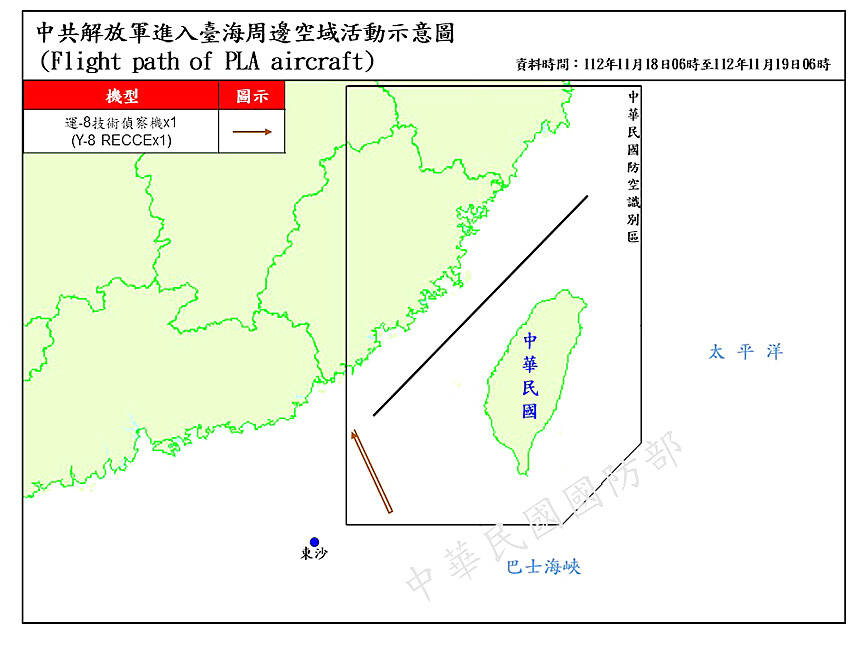The Ministry of National Defense reported renewed Chinese military activity around Taiwan yesterday, with nine aircraft crossing the median line of the Taiwan Strait and warships carrying out “combat readiness patrols.”
With Chinese President Xi Jinping (習近平) in San Francisco last week for the APEC summit, where he met with US President Joe Biden, that military activity around Taiwan had scaled down.
However, the defense ministry reported that starting yesterday morning it had detected nine Chinese aircraft crossing the Strait’s median line, which had previously served as an unofficial barrier between the countries and which Chinese planes now regularly fly over.

Photo courtesy of the Ministry of National Defense
The aircraft involved included Su-30 and J-10 fighters, as well as early warning and electronic warfare aircraft, the ministry said.
The aircraft were accompanying Chinese warships carrying out “joint combat readiness patrols,” it added.
The military sent its own forces to monitor, the ministry said.
The Chinese Ministry of National Defense did not answer calls seeking comment.
China says its activities near Taiwan are aimed at “collusion” between Taiwan separatists and the US and to protect China’s territorial integrity.
Over the past year and a half China has staged two large-scale war games around Taiwan.
Taipei rejects Beijing’s sovereignty claims and says only Taiwanese can decide their future.

DAREDEVIL: Honnold said it had always been a dream of his to climb Taipei 101, while a Netflix producer said the skyscraper was ‘a real icon of this country’ US climber Alex Honnold yesterday took on Taiwan’s tallest building, becoming the first person to scale Taipei 101 without a rope, harness or safety net. Hundreds of spectators gathered at the base of the 101-story skyscraper to watch Honnold, 40, embark on his daredevil feat, which was also broadcast live on Netflix. Dressed in a red T-shirt and yellow custom-made climbing shoes, Honnold swiftly moved up the southeast face of the glass and steel building. At one point, he stepped onto a platform midway up to wave down at fans and onlookers who were taking photos. People watching from inside

A Vietnamese migrant worker yesterday won NT$12 million (US$379,627) on a Lunar New Year scratch card in Kaohsiung as part of Taiwan Lottery Co’s (台灣彩券) “NT$12 Million Grand Fortune” (1200萬大吉利) game. The man was the first top-prize winner of the new game launched on Jan. 6 to mark the Lunar New Year. Three Vietnamese migrant workers visited a Taiwan Lottery shop on Xinyue Street in Kaohsiung’s Gangshan District (崗山), a store representative said. The player bought multiple tickets and, after winning nothing, held the final lottery ticket in one hand and rubbed the store’s statue of the Maitreya Buddha’s belly with the other,

‘NATO-PLUS’: ‘Our strategic partners in the Indo-Pacific are facing increasing aggression by the Chinese Communist Party,’ US Representative Rob Wittman said The US House of Representatives on Monday released its version of the Consolidated Appropriations Act, which includes US$1.15 billion to support security cooperation with Taiwan. The omnibus act, covering US$1.2 trillion of spending, allocates US$1 billion for the Taiwan Security Cooperation Initiative, as well as US$150 million for the replacement of defense articles and reimbursement of defense services provided to Taiwan. The fund allocations were based on the US National Defense Authorization Act for fiscal 2026 that was passed by the US Congress last month and authorized up to US$1 billion to the US Defense Security Cooperation Agency in support of the

HIGH-TECH DEAL: Chipmakers that expand in the US would be able to import up to 2.5 times their new capacity with no extra tariffs during an approved construction period Taiwan aims to build a “democratic” high-tech supply chain with the US and form a strategic artificial intelligence (AI) partnership under the new tariffs deal it sealed with Washington last week, Taipei’s top negotiator in the talks said yesterday. US President Donald Trump has pushed Taiwan, a major producer of semiconductors which runs a large trade surplus with the US, to invest more in the US, specifically in chips that power AI. Under the terms of the long-negotiated deal, chipmakers such as Taiwan Semiconductor Manufacturing Co (TSMC, 台積電) that expand US production would incur a lower tariff on semiconductors or related manufacturing